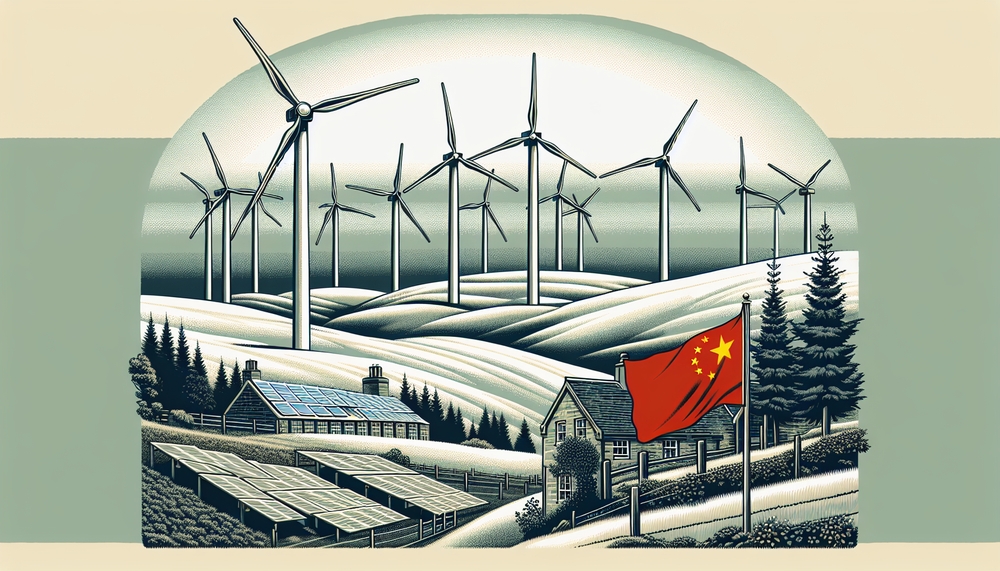Published
- 3 min read
Why China's Role in the UK's Clean Energy Transition Should Not Be Overlooked

The Role of China in the UK’s Energy Strategy
The debate surrounding the UK’s clean energy future often highlights the tension between national security and global supply chain realities. At the forefront of this discussion is China’s dominant position within the renewable energy ecosystem. Despite valid concerns, a closer examination reveals that the UK’s reliance on Chinese technology and resources might not only be unavoidable but also strategic.
National Security Concerns vs. Technological Realities
Sir Richard Dearlove and others from the security community have voiced concerns about the UK’s energy strategy, positing that a dependence on Chinese technology might expose the nation to various security risks. However, these concerns, while warranted, do not necessarily outweigh the benefits of leveraging China’s advancements in renewable technologies.
China’s production capabilities in solar and wind technologies surpass any other nation, offering more cost-effective solutions for countries aiming to meet stringent carbon targets. As seen with the astronomical rise of solar and wind installations in China versus the UK and EU, the sheer scale of Chinese output provides an opportunity rather than an obstacle. Furthermore, energy systems in the UK have implemented rigorous cybersecurity protocols which could mitigate potential risks from foreign influences.
Global Geopolitical Landscape and Economic Implications
The geopolitical dynamics of energy supply chains are becoming increasingly complex. The UK, much like Europe, has experienced the repercussions of dependency on fossil fuels from geopolitically unstable regions. The recent volatility in energy prices due to the reliance on Russian gas underscores the need for a diversified energy approach.
Transitioning to renewable sources, even with significant components manufactured in China, reduces the geopolitical leverage fossil-fuel-rich nations might exert over the UK and the EU. Notably, while nuclear energy is a part of the conversation, it remains a long-term investment fraught with financial and logistical challenges, often involving collaboration with Chinese and Russian companies for reactor design – thus posing similar concerns as those addressed by Dearlove regarding renewables.
The Strategic Move Towards Renewables
In contemplating whether the UK should shift its decarbonisation strategy away from renewables because of China’s market dominance, it becomes clear that such a move might not be in the national interest. As the article indicates, the reliance on Chinese renewable technology is balanced by the benefits that a rapid, cost-effective transition offers, particularly in reducing carbon emissions and stabilizing future energy costs.
The UK’s ongoing commitment to its 2030 clean power mandate can help mitigate long-term dependencies and align with global climate goals. As the rest of the world accelerates towards renewable energy, participation and leadership in this sector will provide the UK with leverage in international energy discourse and enhancement of its energy grid.
Navigating Supply Chain Dynamics
Disruptions in global supply chains pose a significant risk regardless of origin, as evidenced by recent global logistical challenges. Therefore, transparency in sourcing and ethical practices within supply chains is imperative for the UK moving forward. While China remains a pivotal player, initiatives to diversify sources and improve supply chain robustness are crucial strategies that should coexist with current dependencies.
Concluding Thoughts on Energy Strategy
Ultimately, abandoning the current trajectory towards renewable energy and EVs due to concerns about China’s market influence is both impractical and short-sighted. Rather than perceiving Chinese involvement as a vulnerability, the UK should strategically integrate China’s offerings, while investing in its domestic capabilities to create a hybrid model of energy production that includes renewables, nuclear, and alternative resources.
In navigating the energy transition, the UK must adeptly balance security concerns with strategic opportunities, ensuring a robust, diversified, and sustainable energy mix. Acknowledging and leveraging China’s role could be key in creating a resilient future energy framework, resonating with the broader goal of achieving net zero without major geo-economic disruptions.
